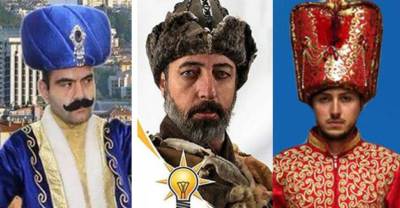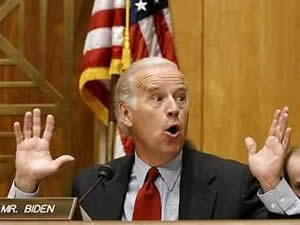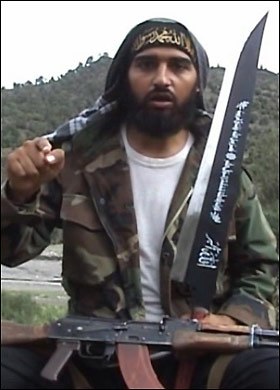Direct Translation via Google Translate. Edited.
by Kamran Hasanov
[REGNUM] For almost four decades, Türkiye has been at war with the Kurdistan Workers' Party. Previously, Ankara acted with full-scale forces and fought on its territory. These have now taken the form of anti-terrorism operations in Turkey with periodic bombing raids in Iraq and ground missions in Syria. However, the Kurdish issue still makes the Turkish leadership nervous.
On October 3, the head of the Turkish Ministry of Internal Affairs, Ali Erlikaya, announced the start of the anti-terrorist operation “Heroes”. Nearly a thousand people have been arrested on suspicion of extremism and terrorism, a quarter of them in Istanbul. Up to 800 illegal weapons were confiscated.
The operation, which claims to be the largest in history, is being carried out in 64 of the country's 81 provinces. Immediately afterwards, fighting spread to neighboring Iraq. The Turkish Air Force attacked militant bases there.
The formal reason for the large-scale mission was given by attacks by PKK militants in Ankara. On October 1, they attacked the building of the Turkish Ministry of Internal Affairs in the center of the capital. Two militants were involved in the operation, one of whom committed a suicide bombing. The second was detained, but the attackers managed to injure two police officers.
The intention of the government of Recep Tayyip Erdogan to launch a large-scale operation is connected not only with a formal reason, indicating the preservation of the potential of the PKK in Turkey.
Erdogan’s determination is strengthened by the fact that the PKK threatens not only stability in society, but also his personal security, and encroaches on the institutions of power. After all, on the day of the attack in Ankara, the opening of the parliament session, which had gone on summer vacation, was planned. The explosion occurs right next to the building of the Grand National Assembly. Erdogan was supposed to speak there personally.
The PKK claims responsibility for the attack and calls it a "warning" signal and retaliation for Turkey's military actions against militants in Syria and Iraq. That is, this is a personal attack against Erdogan.
The Turkish President is forced to react to show retribution and strength against the troublemakers. He reminds us that “we may come suddenly at night.” But words that are not backed up by action and strength—especially in the Middle East—are perceived as weakness. In Erdogan's many bellicose statements, what is striking is no longer the degree of decisiveness, but the following:
“Because of a terrorist organization, we have been forced to endure human and economic losses for 40 years. We want to eliminate it both within our borders and beyond. We can consolidate the military successes we have already achieved with new achievements.”
On the one hand, Erdogan announces the success of the anti-terrorist fight, but on the other hand, wittingly or unwittingly, he makes it clear that the threads of the conflict stretch back to the 80s and the struggle (in fact, the war with Kurdistan) is not yet over.
If you look at it in historical retrospect, the Kurdish issue in Turkey dates back to the beginning of the last century.
During the 1920s and 1930s, the Kurds rebelled against the Turkish Republic 15 times. But the modern stage is no less ambitious. It is marked by the formation of the Kurdistan Workers' Party in 1978, which set the goal of separating the eastern and southeastern vilayats inhabited by Kurds from Turkey and creating “Turkish Kurdistan”.
In 1993, the PKK softened its course and declared the formation of Kurdish autonomy as its goal. However, this does not change the essence. Where there is autonomy, there is independence. Let's take a look at Iraq and Syria, where formally the Kurds remain part of the Arab republics, but de facto (since 2003 and 2011, respectively) live their own lives and enjoy sovereignty.
After large-scale battles at the end of the 20th century and the arrest of PKK leader Abdullah Ocalan with the support of Israeli intelligence services, the conflict did not end. The Turkish army carried out many operations in the new century. One of the largest took place in 2008 with almost 40 thousand dead on both sides.
Kurdish separatists, represented by the same PKK, used every opportunity to undermine Ankara's power in the east. The fall of Saddam Hussein's regime in 2003 opened a window of opportunity for the Kurds. Although the fight moved to Iraqi territory, where the Turkish Air Force carried out strikes and Turkish bases appeared, the successful case called “Iraqi Kurdistan” created a precedent for the resuscitation of the “Turkish Kurdistan” case.
Erdogan tried to negotiate with the government in Baghdad for joint action against the PKK. Baghdad turned a blind eye to the bombing of Kurdish bases in the Gandil Mountains.
Since 2013, the PKK itself has even made concessions and announced a truce with Turkey due to the immensity of joint actions against the Islamic State (banned in the Russian Federation). But the truce lasted two years. First, the Turkish Armed Forces (TAF) entered northern Iraq, and then launched a large-scale operation in Cizre and Silopi, involving 10 thousand military and police forces using such troops.
By this time, it became clear that the power and numbers of the PKK were not enough to successfully fight the second NATO army. The only chance is the Iraqi scenario. In July 2016, the militants were close to this. The military nearly overthrew Erdogan. But the surviving president, even though he withdrew his forces from Iraq immediately after the coup, only four days later Turkish aviation resumed large-scale bombing of PKK bases.
The same trick was repeated in January 2017, when Turkish Prime Minister Binali Yildirim agreed with the Iraqi authorities on the withdrawal of troops, but two days later his deputy canceled this agreement. The reason for maintaining Turkish forces in Iraq later was not only the fight against terrorism on distant approaches, but also the referendum on the independence of Iraqi Kurdistan. Baghdad was already powerless to object, for it itself feared for the final collapse of the country.
In the summer of 2016, Erdogan formally occupied Syrian El-Bab as part of Operation Euphrates Shield to fight ISIS (banned in the Russian Federation). Another blow to Kurdistan, but this time in Syria. The Iraqi scenario ultimately took place not in Turkey, but in Syria.
Having received support from the United States and the American coalition, the Kurds occupied significant territories in the north of the Arab Republic. The Kurds had both a party (PYD Democratic Union) and an army (YPG) there. Supported by oil resources concentrated in Trans-Euphrates and US military bases, the project of Syrian Kurdistan has almost become a fait accompli (a fait accompli). But Erdogan intervened.
At the beginning of 2018, Ankara began to liquidate the Kurdish canton in Afrin. Operation Olive Branch, despite criticism from the US and EU (and with the tacit consent of Moscow), was successful.
Then Erdogan took up Trans-Euphrates. The "Source of Peace" the following year established control over the lands from Ras al-Ain to Tel Abyad, completely fragmenting the YPG zones of ownership. US pressure had no effect, despite Donald Trump's threats to " destroy the Turkish economy".
Erdogan was stopped and at the same time saved (from US sanctions) by the Kremlin’s intervention. In Sochi, Erdogan and the Russian president agreed to withdraw the YPG from the remaining territories bordering Turkey.
Incapable of direct opposition on the battlefield, the PKK and its Syrian offshoot the YPG responded with terrorist attacks in Turkey and Iraq against Turkish civilians and military personnel.
On November 13, 2022, they carried out a major terrorist attack on a tourist street in Istanbul, killing six people and injuring 80. Turkey was responsible for CTO at home and in Iraq. A ground invasion took place in the Arab Republic. In April of the same year, the VGT destroyed 50 targets, and the Turkish Ministry of Defense declared victory.
Erdogan planned to clear out the remaining Kurdish cantons in northern Syria, citing the impracticability of the Sochi memorandum. However, this operation was initially stopped by the disapproving position of Russia and the United States, and then the issue was frozen due to the lira crisis.
In addition, Erdogan launched the normalization of relations with Saudi Arabia, the UAE and Egypt, which by this time had themselves made peace with Damascus. SAR President Bashar al-Assad objected to another Turkish intervention in Syria, and investments in the Turkish economy forced the opinion of the Gulf monarchies to be taken into account. After Syria returned to the Arab League, Erdogan himself began to hint at peace with Assad.
The latest terrorist attack in Ankara, although forcing Erdogan to take decisive large-scale action, does not fundamentally change anything in the regional situation.
Operations inside Turkey will not worry any of the neighbors. There, Ankara acts within the framework of the principle of combating terrorism and territorial integrity. However, the expansion of military operations into Iraq and even more so into Syria is fraught.
Iraqi President Abdel Latif Rashid has already condemned "Turkish violations in Sulaymaniyah, Erbil, Dohuk and other regions of Iraqi Kurdistan." He gave an example of solving the Kurdish problem with Iran and hints at the same scheme with Turkey. After the latest TSA airstrikes in Iraq, Turkish and Iraqi Defense Ministers Yashar Güler and Sabit al-Abbasi have already discussed joint steps to combat terrorism.
Meanwhile, Ankara threatened another ground operation in Syria, but the factor of the United States and Russia (even despite their confrontation in Ukraine) cannot be canceled. Arab countries will also put pressure on Turkey, in which they have invested billions of dollars.
At the same time, it is also not possible to say that Erdogan will stop there. Regional elections are coming up. The president's party wants to return the lost city halls of Istanbul, Ankara and Antalya. Therefore, it will be necessary to take action against the PKK and unite the electorate around a common threat. Moreover, previous military operations in Syria and Iraq chronologically coincided with presidential, parliamentary and municipal elections.
So it is possible that Erdogan, in addition to the CTO in Turkey, will conduct small operations in Iraq and Syria. The international situation, when everyone is busy with Ukraine, would seem to favor this.
However, it is still risky to go beyond air operations. The day before, the Americans had already fired a warning shot, shooting down a Turkish drone over Syria.
Ground operations are all the more fraught with a deterioration in relations with NATO. Erdogan’s nods towards the alliance immediately after the May elections in the form of support for the membership of Ukraine and Sweden were necessary for him not only to unfreeze the transfer of F-16s to Turkey, but also to make the Turkish economy more attractive for Western investment. If Erdogan clears Trans-Euphrates, some Fitch agency will again downgrade Turkey’s credit rating, and the lira will hit another bottom. And in Dolmabahce they know this very well.
|
 ...the occupiers of Greek Asia Minor...
...the occupiers of Greek Asia Minor...
 ...al-Qaeda's Syrian affiliate, from which sprang the Islamic State...
...al-Qaeda's Syrian affiliate, from which sprang the Islamic State... ...the occupiers of Greek Asia Minor...
...the occupiers of Greek Asia Minor... ...46th president of the U.S. Being a self-defined foreign policy whiz kid means never having to say you're sorry...
...46th president of the U.S. Being a self-defined foreign policy whiz kid means never having to say you're sorry... ...Turkey's version of Mohammed Morsi but they voted him back in so they deserve him. It's a sin, a shame, and a felony to insult the president of Turkey. In Anatolia did Recep Bey a stately Presidential Palace decree, that has 1100 rooms. That's 968 more than there are in the White House, 400 more than in Versailles, and 325 more than Buckingham Palace, so you know who's really most important...
...Turkey's version of Mohammed Morsi but they voted him back in so they deserve him. It's a sin, a shame, and a felony to insult the president of Turkey. In Anatolia did Recep Bey a stately Presidential Palace decree, that has 1100 rooms. That's 968 more than there are in the White House, 400 more than in Versailles, and 325 more than Buckingham Palace, so you know who's really most important... ...formerly ISIS or ISIL, depending on your preference. Before that they were al-Qaeda in Iraq, as shaped by Abu Musab Zarqawi. They're really very devout, committing every atrocity they can find in the Koran and inventing a few more. They fling
...formerly ISIS or ISIL, depending on your preference. Before that they were al-Qaeda in Iraq, as shaped by Abu Musab Zarqawi. They're really very devout, committing every atrocity they can find in the Koran and inventing a few more. They fling